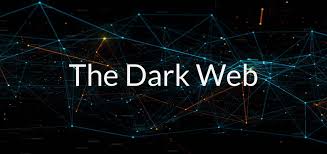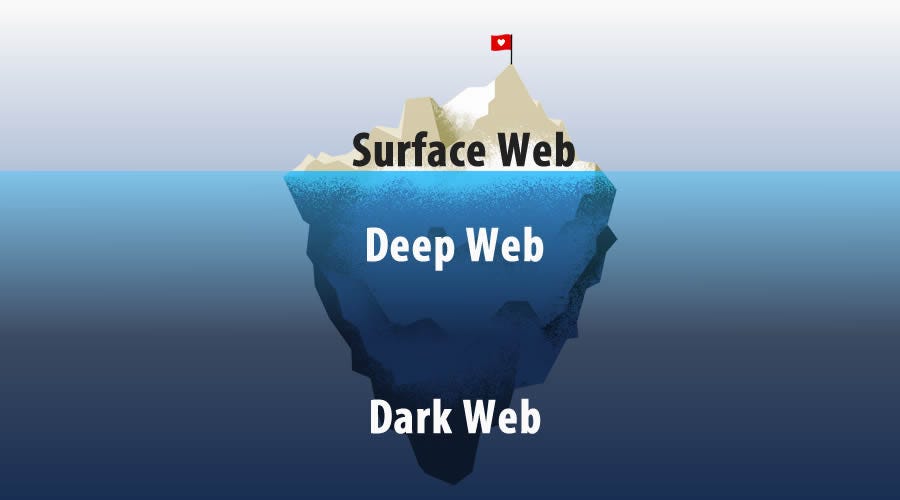
Your business survives in large part due to the data you have amassed. It’s all about your clients: Their payment processing information, the history of transactions with your company, their key contacts and decision makers: This is the life blood of your business.
When you couple that data with your own internal information like your banking and credit data, employee passwords, and authentication factors – those items which allow access to your network data – you are looking at an extremely valuable commodity. Not just to you, but to cyber criminals.
It is more than likely that some of your information is for sale on the Dark Web.
There is a Black Market for stolen data: It’s called the Dark Web. Do you know how much of your data is out there on the market?
Think you can find just about anything using Google Search? Think again. Google only accesses the Surface Web (also known as the Clear Web), which accounts for only 4% of the total content that exists on the World Wide Web. According to WorldWideWebSize.com, research has shown over 4.5 billion indexed pages. While exact no page count for the Deep Web (which includes the Dark Web), it is estimated that it contains 7,500 terabytes (tb) of information. This translates into over 500 billion individual documents. The Surface Web contains about 1 billion.
This is what comprises the World Wide Web:
Internet (Surface/Clear Web) - Legitimate; fully indexed and accessed through a standard browser.
Deep Web – Legitimate; not indexed; a place where sensitive data is stored (passwords, account information, etc.).
Dark Web - Mostly illegal activity; not indexed; need special tools to access.
This is what that looks like:

The Dark Web is a very small section of the Deep Web that operates on ‘darknets’ or ‘overlay networks’ – networks that are layered on top of other networks. To access the Dark Web, you need special software with separate communications protocols and authorizations – and if you start acquiring what you need to access it, there is plenty of time to think about what you’re doing. Nobody just stumbles into it.
The first rule is: If you don’t need to go there, don’t go there. Ask any reputable member of the Charlotte IT Support community, and the first thing they should ask is, “Why would you want to go there?” In Cyber World, the Dark Web is ‘the wrong side of the tracks‘ - the bad part of town. Novices are forewarned not to venture in there. It’s where stolen data, extortion, and even the services of killers-for-hire are available. In effect, it’s the biker bar with a couple of dozen Hell’s Angels hanging around out front. Drive on a bit and find another place to have a drink.
Experts like Managed Services Providers - or any type of IT consulting service, know not to fool around in there – and your typical IT professionals do not want their clients surfing through there – one wrong step can release a world of hurt on your network and your IT HelpDesk and field technicians will be scrambling to stem the damage.
So how do you find out how much of your data, like your employees’ passwords and login credentials, are up for sale on the Dark Web? Have a trustworthy expert run a Dark Web Scan.
How do you check to see if you are on dark web?
Perform a Dark Web Scan. This type of scan looks for your sensitive information among the available lists of stolen data (data dumps) pages where such data is listed for sale. It is imperative that that the IT support firm that performs the scan is well known to you and trusted – not a ‘Break/Fix’ hourly rate ‘IT Guy’ – use a respected Managed IT Services provider.
Why? Because to find your data, you must reveal the data to whoever performs the scan. It may take several scans to complete the process. There are also services that perform ongoing Dark Web Monitoring – in effect it is scanning that never stops.
There are also companies like Experian that offer limited versions of these scanning services. That may be okay for a consumer, but if you are a business with reliable IT support, have them do it – most use a third-party vendor. If they don’t know how to perform this scan or have a partner/conduit to do it, then you are using inferior IT services.
Frequently Asked Questions
What does it mean if my info is on the dark web?
A: As you should surmise, it’s not a good thing. Information that is readily accessible on the internet does not wind up for sale on the dark web. The information there is potentially damaging to the consumer or business that owns or safeguards it. A crook getting ahold of data like Social Security Numbers (SSNs) Bank account numbers, and credit card numbers (among others) can do devastating things with that information.
How much does a dark web scan cost?
A: It varies. Many companies, like Experian, will perform the first scan free, then ongoing scanning is a monthly fee ($10/month for Experian), but that is geared towards consumers. Services like LifeLock include Dark Web scanning as part of their protection program.
Is it Legal to Surf the Dark Web?
A: Yes. Both the Dark Web itself and your ability to go there are perfectly legal. However, there are many opportunities to engage in illegal activity there – such as buying stolen data and things that are more sordid. It is not illegal to own an automobile, but it is against the law to intentionally run someone over. It's what you do with it that determines legality.
What is inside the deep web?
A: It primarily includes legitimate data that needs to be protected from casual observers. Among other things: Electronic bank statements, health records, emails, chat messages, passwords/login credentials, and private content on various platforms such as social media. It’s filled with information that consumers and businesses do not want the public to gain knowledge of – and rightly so.
Any website where you adopt a username and profile (Facebook, Twitter, Instagram, et. al.) protects that information by using the Deep Web, even though the site you visit is accessed through the Surface Web.
How secure is your network?
As a longstanding, reputable member of the Charlotte IT Support community, ITFirm.com offers a FREE, no-risk network and security assessment. We perform a non-intrusive scan that allows us to deliver a comprehensive report of the state of your system and its vulnerabilities that is yours to keep. There are no strings attached, and you are under no obligation to ever use our IT Services.
The two best defenses are next-generation Cybersecurity to protect your data from theft, and a top-notch Managed Services Provider to ensure continued reliability and defenses against newly emerging threats.
We put our 100% Money Back Guarantee in writing, so there is no risk in trying us out. Because we do not require a ‘hard’ contract, our clients can fire us at any time with 30 days’ notice. We have to be good.
Among the Managed IT services we provide:
IT HelpDesk Service
Onsite IT Support
Cybersecurity
Cloud migration and management
Email migration services
Backup and disaster recovery
VoIP phone systems
IT disposition and recycling
Office moves
White label services (IT to IT)
Planning an Office Move?
Contact us today! We have the experience to ensure a seamless transition. After the move, your employees will arrive at the new location to find their IT infrastructure ready and open for business!
For more information on office moves, or to receive your FREE no-risk network and Cybersecurity assessment, just fill out the form on this page or call us at:
704-565-9705

